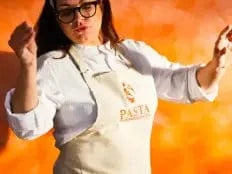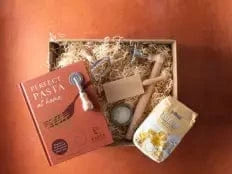‘Parla come mangi!’ (Literally, ‘Speak like you eat!’ – i.e speak plainly!)
‘Lui è un pezzo di pane’ (‘He’s a piece of bread’, i.e he’s a good guy)
‘Hai le mani di pasta frolla’ (‘You’ve got dough hands’, i.e you’ve got butter fingers’)
The Italian language has many food-related sayings. Some are simple, whereas others may seem confusing for anyone who is not well-versed in Italian culture. Regardless of how esoteric these common phrases can be, the sheer volume indicates the centrality of food to italianità. At the heart of Italy’s connection to food is a love of pasta, something we’ve embraced at Pasta Evangelists. But why is pasta so important to Italian culture? Let’s take a look.
‘A tavola non si invecchia’ – The importance of eating together
‘At the table, one does not age’. This beautiful old proverb sums up the Italian approach to eating and indicates why pasta is so important. Italians like to eat together, and they take their time when doing so. The dinner table is where some of life’s most important events are contemplated and discussed. Over a few hours, as well as numerous dishes, Italians bond with friends and loved ones over the simple pleasure of a good, home-made meal.
Pasta is a fundamental part of this experience. It’s not uncommon for nonnas to spend hours on Sunday, for example, preparing fresh pasta to be enjoyed later by the whole family. Kneading the dough, rolling it out, cutting, and then filling it is all part of the process – grandchildren will watch, learn, and pass on their knowledge to future generations.
The deliberate process of making and consuming pasta is emblematic of how Italians enjoy their food – slowly and among loved ones.
‘L’arte di arrangiarsi’ – Making the most of things
There’s a verb in Italian which is quite difficult to translate – ‘arrangiarsi’. A close English equivalent might be ‘to get by’, but it has more of a positive spin. This verb denotes the Italian characteristic of making the best of a bad situation – being resourceful in the face of scarcity.
But how does this relate to pasta? Well, consider La Cucina Povera (peasant food). Born out of economic hardship, this Italian cuisine uses small amounts of ingredients that are cheap and easy to come by – common examples include tripe or pigs trotters, often considered to be ‘waste’ products.
Pasta remains an economical way to give more substance to a meal. Dishes like spaghetti alla carbonara, pasta fagioli, and passatelli in brodo are all examples of delicious pasta recipes that come from humble origins but are enjoyed by many today.
‘L’America’ – Italians across the world
Wherever you go in the world, you’re likely to encounter at least a handful of Italians. This is because millions of Italians moved away from il Bel Paese during the 19th and 20th centuries, looking to escape poverty in hope of a brighter future.
From the East coast of the US to South America, Scotland, and even Australia, Italian families put down their roots and began working to create a new and better life. This meant that the Italians’ culinary heritage travelled to many far-flung destinations. Pasta, as easy to carry as it was to make, came with them and would soon stand as a symbol of the distant homeland. While the old recipes resonated, new ones were also created using exciting new ingredients. Think about macaroni cheese, an American invention, or ñoqui con taco – Argentina’s take on gnocchi.
Dalle montagne alle spiagge – Italy’s diversity
Diversity and variety could be another reason why Italians hold pasta in such high regard. Italy is the most biodiverse country in Europe – meaning that it has the largest range of both plants and animals across the continent. From the verdant mountains of Lombardy to the arid ravines of Puglia, the Italian peninsula is home to a dizzying array of habitats.
This biodiversity is mirrored by the cultural differences found within the country. Every town seems to have its own dialect and traditions, shaped by unique histories and multiple foreign influences – Germanic tones are present in the North whilst Greek and Arabic ones can be found in the South.
Amongst all this difference, pasta remains a unifying element. As an ingredient, its versatility cannot be denied. Pasta can be made into innumerable shapes (with some rather strange names) and paired with an abundance of delicious sauces. Whilst Italy is kaleidoscopic in its culture, customs, and languages, pasta can be found everywhere.
At Pasta Evangelists, we bring a taste of Italy to your kitchen. Prepared using the freshest ingredients, our gourmet pasta dishes are perfect for those looking to enjoy restaurant-quality meals, delivered to your door, and ready in under five minutes. Order from our weekly menu today, and we’ll offer you 25% off your first delivery - simply enter the code BLOG25 at checkout.
Want even more pasta perks? Subscribers receive new recipes to try each week, with free delivery and 15% off each dish. Subscribers also gain access to exclusive gifts and perks, as well as early access to Pasta Evangelists events and classes.
: invalid url input)







